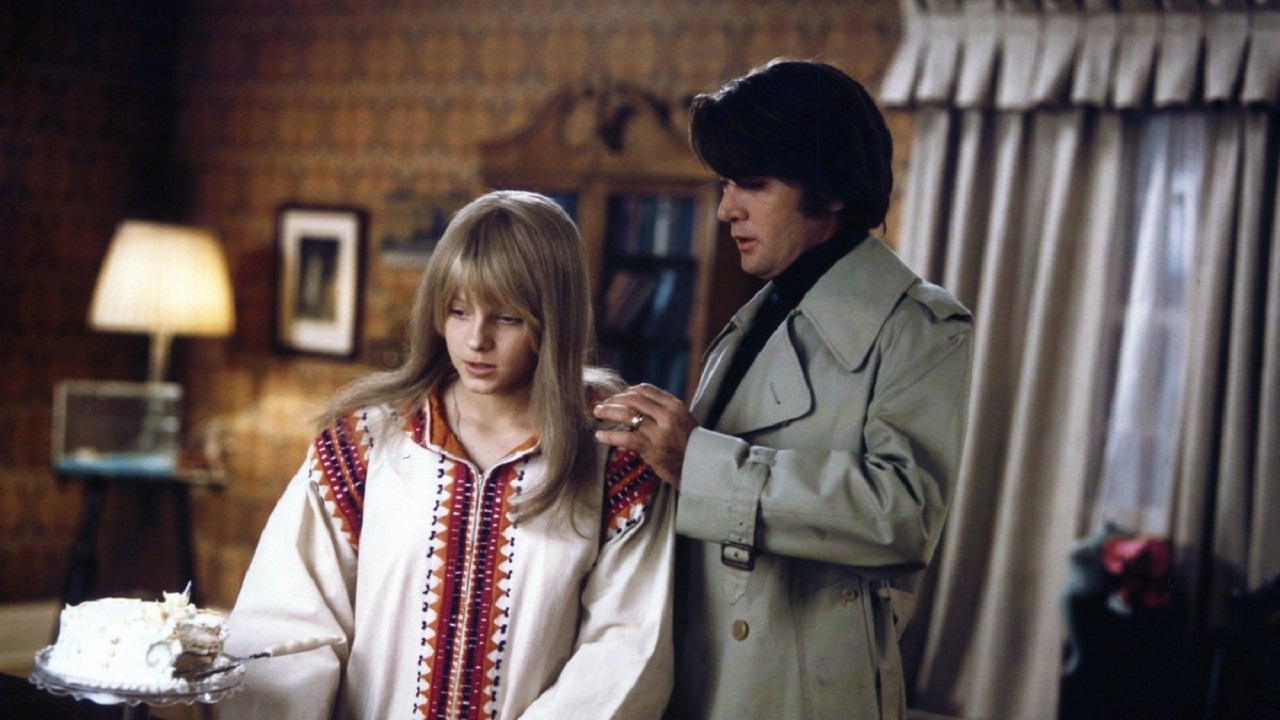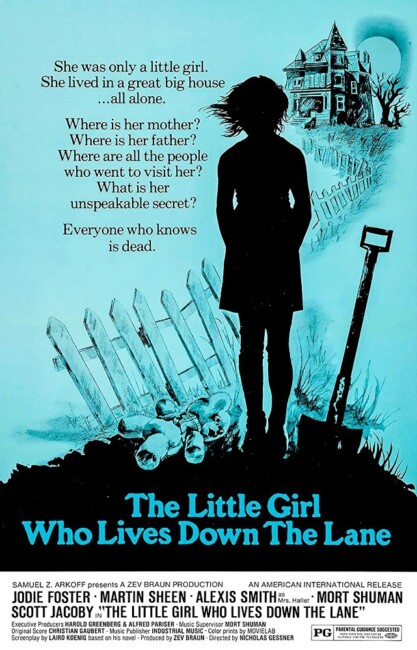Crew
Director – Nicholas Gessner, Screenplay/Based on the Novel The Little Girl Who Lives Down the Lane by Laird Koening, Producers – Zev Braun, Denis Heroux, Eugene Lepicier & Leland Nolan, Photography – Rene Verzier, Music – Christian Gaubert, Special Effects – Christopher Harbonville, Art Direction – Robert Prevost. Production Company – Zev Braun Productions/ICL/Filmedis-Filmel.
Cast
Jodie Foster (Rynn Jacobs), Scott Jacoby (Mario Podesta), Martin Sheen (Frank Hallet), Mort Shuman (Officer Ron Miglioriti), Alexis Smith (Cora Hallet)
Plot
Thirteen year-old Rynn Jacobs lives in a house with her father, a renowned poet. Whenever visitors come, she maintains an elaborate pretence that her father is in but too busy working to be disturbed. In truth, her father has committed suicide after being diagnosed with cancer and has set her up to be self-sufficient, not wanting her fine mind to be stifled by orphanages. This ruse is now endangered by both the landlady, the pushy Mrs Hallet, and her paedophile son Frank who has his eyes on Rynn. Both see through Rynn’s evasions and insist on talking only to her father. As her freedom becomes threatened, Rynn’s only recourse is to kill.
This quiet and unassuming thriller could easily have served as part of the whole subgenre of psycho-thrillers that came out in the 1960s copying Psycho (1960) and What Ever Happened to Baby Jane? (1962). Instead it turns the genre completely on its head. In another version of the story, Martin Sheen’s paedophile son would almost certainly be the hero who discovers Jodie Foster’s secret, yet the thrust of sympathy throughout remains with the traditional psycho character who is seen not as deranged, merely to be defending her freedom.
Compare The Little Girl Who Lives Down the Lane to Psycho, which had a near-identical plot where Anthony Perkins’ Norman Bates lived alone in a big old house and maintained the elaborate pretence that his mother was alive, but where the heroes of that story were the people who determinedly pushed past his evasions to find the truth (which was similarly also hidden down in the cellar). If Psycho were The Little Girl Who Lives Down the Lane, Norman Bates would be the hero who was only protecting his freedom and was killing Janet Leigh and the others because they threatened to expose his world. The reversal of traditional sympathies is striking.

Playwright/novelist Laird Koenig conducts a subtle and effective adaptation of his own 1974 novel and this is married to some good performances. Particularly well written are the careful evasions that come in the dialogue that Jodie Foster is given. The fifteen year-old Foster, who had just come from her sensational Oscar-nominated part as the teen hooker in Martin Scorsese’s Taxi Driver (1976), gives a strong and intelligent performance. There is fine support from Scott Jacoby, Mort Shuman and Alexis Smith. The only person miscast is filmdom’s champion of liberal understanding Martin Sheen, who, try as he might, just cannot do villainy.
The Little Girl Who Lives Down the Lane‘s main failing is in director Nicholas Gessner. Gessner regrettably is not an Alfred Hitchcock – as a director he never gets to the centre of a scene. Hitchcock would probably have brought out more of the bubbling sense of black humour, like the scene where Jodie Foster casually describes how she disposed of her mother and learned about preserving bodies at the local library. As a director, Gessner seems merely a passive observer and always lets the script carry the film – indeed with both the film and book’s economic confinement of the action to a single set, one can see the best medium for the story would actually be as a stage play.


